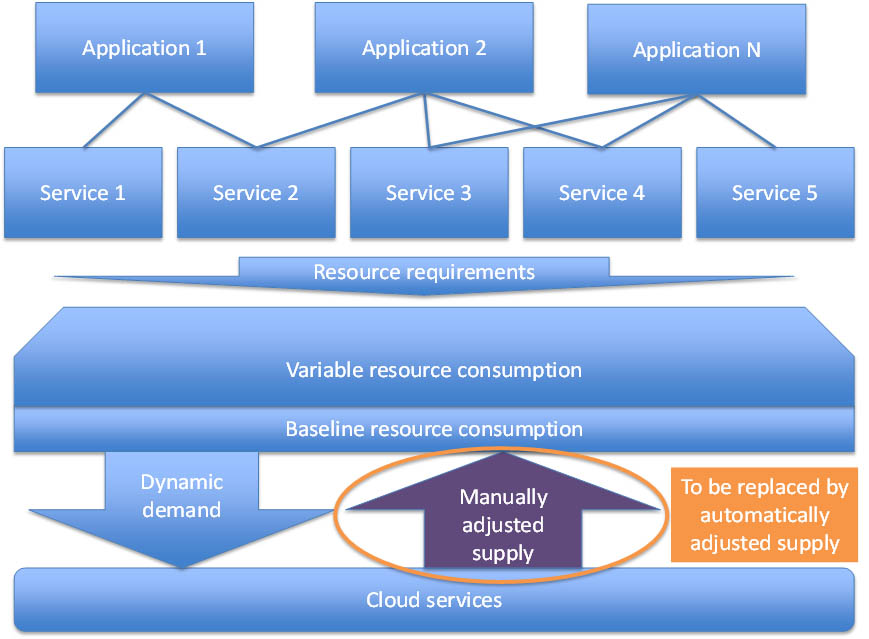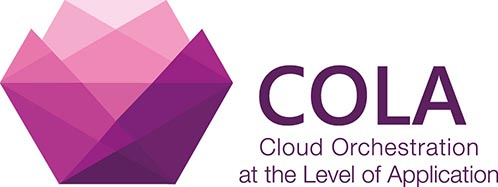Update - September 2019:
The actual duration of the Innovation Action COLA was from January 2017 to September 2019.
The official run-time until June 2019, was extended by three project months.
January 2017
Project COLA is an Innovation Action funded by the European Commission as part of the Horizon2020 Programme. The COLA project started in January 2017 and will last 30 months. The consortium includes 10 companies and 4 research organisations from 6 European countries, including the United Kingdom, Hungary, Sweden, Switzerland, Spain and Germany. The coordinator of the COLA project is Dr. Tamas Kiss, University of Westminster (UK).
Why? SMEs and public sector organizations increasingly investigate the possibilities to use cloud computing services in their everyday business conduct. Accessing services and resources in the cloud on-demand and in a flexible and elastic way could result in significant cost savings due to more efficient and convenient resource utilization that also replaces large investment costs with long term operational costs. On the other hand, the take up of cloud computing by SMEs and the public sector is still relatively low due to limited application-level flexibility and also security concerns.
How? Project COLA (Cloud Orchestration at the Level of Application) aims to increase the adoption of cloud computing services by the above mentioned two strategic target communities. Typical industry and public sector applications require resource scalability and efficient resource utilization in order to serve a variable number of customers with dynamic resource demands, and to suitably optimize resource consumption and costs. However, the dynamic and intelligent utilization of cloud infrastructure resources from the perspective of cloud applications is not trivial. Although there have been several efforts to support the intelligent and coordinated deployment, and to a smaller extent also the run-time orchestration of cloud applications, no comprehensive solution has emerged until now that could be applied in large scale near operational level industry trials.
Overall Objective. The overall objective of the COLA project is that by building on and extending current research results, it will define and provide a reference implementation of a generic and pluggable framework (the MiCADO framework) that supports the optimal and secure deployment and run-time orchestration of cloud applications. COLA will demonstrate the applicability and impact of the solution via large scale near operational level SME and public sector pilots and demonstrators, and will also define a clear pathway how the innovation can be delivered to the market.

To overcome the problem of manual allocation of resources for applications, the MiCADO framework is developed as part of the COLA project.
The MiCADO framework supports the autoscaling of applications on two levels:
1. Scaling at container level (based on Kubernetes).
2. Scaling at virtual-machine level (based on Occupus).
The definition of the application will be done in a TOSCA-based application description, which is divided into three parts:
1. The specification of the services.
2. The specification of the virtual machine.
3. The specification of the scaling rules for both levels.
After commissioning the service, it can be controlled and maintained in various ways.
Through the integrated dashboard, various aspects of the application can be visualized in their production environment.
The dashboard is encrypted by means of self-signed or provided TLS / SSL and is secured by a login.
Via a secured REST interface, applications can be started, stopped, updated or listed.
All components have detailed logs, which are stored centrally for more experienced users.
The current status of the MiCADO framework can be viewed either on this page or on the associated GitHub repository.
A detailed documentation of the MiCADO framework can be found at https://micado-scale.readthedocs.io/en/latest/.
